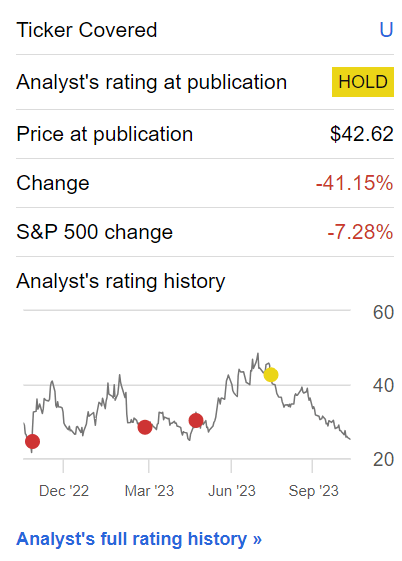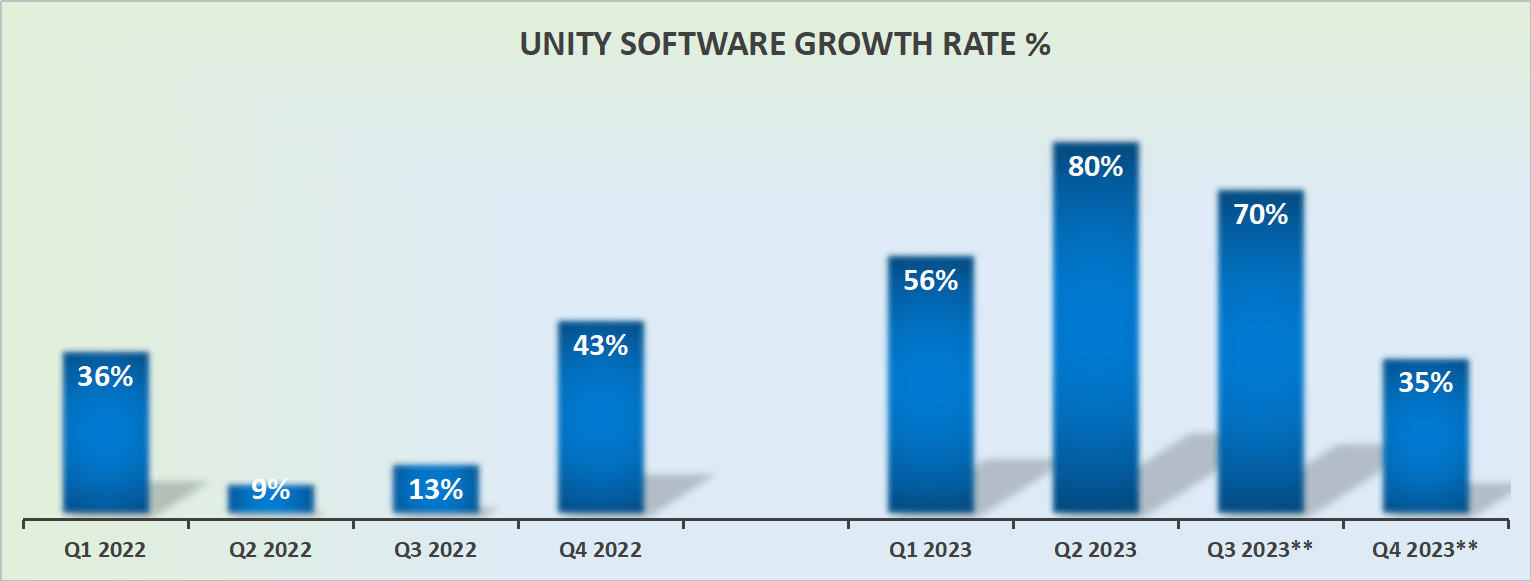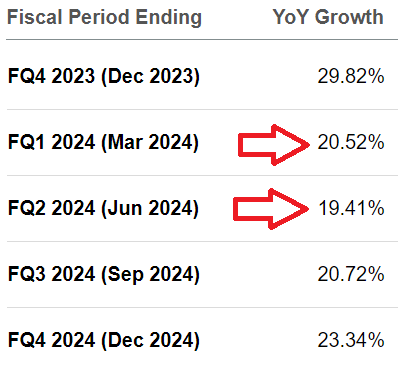Summary:
- Unity Software Inc.’s troubled financials reveal ongoing challenges.
- Revenue growth rates are expected to decelerate in 2024.
- Unity’s balance sheet strained by convertible notes.
AsiaVision
Rapid Recap
In my previous analysis of Unity Software Inc. (NYSE:U), I said:
I’m a professional investor. As such, when the facts change, I recognize that it’s important to take a step back and reappraise one’s investment thesis. The successful investor must always be willing to destroy one’s investment thesis and seek out disconfirming evidence.
What prompted that comment?
Author’s work on U
I reversed my sell rating on this stock from a sell to a hold. Why?
Because I wanted to see what others were seeing. I wanted to leave room for doubt that I could be wrong. Perhaps Unity was undervalued. And yet. And yet. No sooner did I upgrade Unity to a hold than the stock would embrace a relentless descent into the abyss.
But will I issue my sell rating now? No! Do you know why?
Because I know that stocks never move in straight lines. Even though I continue to believe that Unity is overvalued, as I’ve done for a long time, I also know that the stock in the near term is pricing in a lot of pessimism. Consequently, it doesn’t bode well for me to now issue a sell rating, as I recognize that the stock is now negatively charged.
Even though I believe that over the next year or so, investors will look back to $25 as a mirage to aspire towards.
We are now about a week away from Unity’s highly anticipated Q3 earnings post-market on 9 November. Stay tuned for updates to follow.
Cockroaches in the Kitchen
The stock is down. The CEO is out. And the bulk of its EBITDA figure is made up of stock-based compensation.
Further, one more pressing matter, Unity’s dollar-based net retention rate. Will this figure stabilize at around 106%? Or will this figure continue to progress towards 100%?
These are all difficult elements facing the stock. But they were not thesis-breaching matters when taken one at a time and in and of themselves. But all together?
Unity Reaffirms Financial Targets
U revenue growth rates
Unity recently reaffirmed its 2023 outlook. This means that in all likelihood, Unity’s growth rates have one more quarter ahead of close to 40% CAGR, before its comparables become too challenging to compare against, and its revenue growth rates substantially decelerate.
As a point of reference, let’s consider analysts’ expectations:
SA Premium
Looking ahead to 2024, analysts expect Unity’s growth rates to decelerate to around 20% CAGR. Even if these estimates prove to be too conservative, one way or another, I believe that it’s safe to say that Unity’s prospects as a hyper-growth company, delivering +30% CAGR, are now in the rearview mirror.
Balance Sheet: Loaded Problems
Unity’s balance sheet holds approximately $1.1 billion of net debt in the form of convertible notes. These convertible notes account for about 11% of its market cap, and they are due in 2026. Naturally, Unity would like to get ahead of its conversion date. Put another way, I believe that over the next two years, Unity will need to refinance these notes.
Now, to complicate matters, these convertible notes were issued when Unity’s share price was close to $200, at Unity’s peak share price, in November 2021 (page 57). Today, with its share price down 80% from that peak, this will mean that the terms that Unity will have to refinance these convertibles on stricter and more cumbersome terms. And Unity will categorically not be able to refinance at 0% interest, in line with their prior convertible notes.
The Bottom Line
Unity Software Inc. continues to grapple with profound challenges, especially in the context of its balance sheet and financial structure.
The presence of significant net debt through convertible notes, coupled with the burden of potential refinancing at less favorable terms due to the stock’s substantial decline, weighs heavily on its financial outlook.
Furthermore, the growing concern surrounding the sustainability of its dollar-based net retention rate adds an additional layer of uncertainty. With its revenue growth rates expected to decelerate significantly in the coming quarters, Unity’s previous status as a high-growth company appears to be a distant memory.
These factors collectively contribute to a bearish sentiment, reflecting the intricacies and difficulties Unity faces in navigating its financial landscape.
Analyst’s Disclosure: I/we have no stock, option or similar derivative position in any of the companies mentioned, and no plans to initiate any such positions within the next 72 hours. I wrote this article myself, and it expresses my own opinions. I am not receiving compensation for it (other than from Seeking Alpha). I have no business relationship with any company whose stock is mentioned in this article.
Seeking Alpha’s Disclosure: Past performance is no guarantee of future results. No recommendation or advice is being given as to whether any investment is suitable for a particular investor. Any views or opinions expressed above may not reflect those of Seeking Alpha as a whole. Seeking Alpha is not a licensed securities dealer, broker or US investment adviser or investment bank. Our analysts are third party authors that include both professional investors and individual investors who may not be licensed or certified by any institute or regulatory body.
Strong Investment Potential
My Marketplace highlights a portfolio of undervalued investment opportunities – stocks with rapid growth potential, driven by top quality management, while these stocks are cheaply valued.
I follow countless companies and select for you the most attractive investments. I do all the work of picking the most attractive stocks.
Investing Made EASY
As an experienced professional, I highlight the best stocks to grow your savings: stocks that deliver strong gains.
-
- Deep Value Returns’ Marketplace continues to rapidly grow.
- Check out members’ reviews.
- High-quality, actionable insightful stock picks.
- The place where value is everything.

